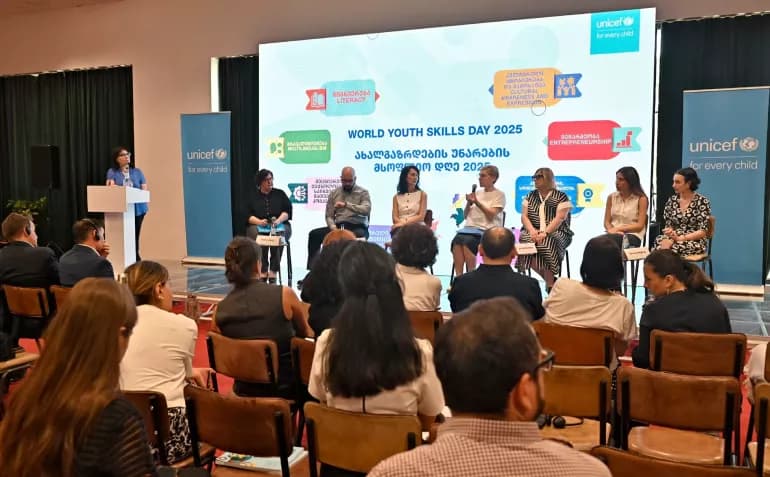UNICEF highlights major skill gaps among Georgian youth in new study

Author
Front News Georgia
Marking World Youth Skills Day, UNICEF released a study, revealing significant skill gaps facing adolescents in Georgia, as revealed in its newly released study on youth competencies. The organization is calling for a robust and coordinated effort to strengthen the cognitive, emotional, and social development of young people nationwide.
With backing from the French government, the mapping study—Skills Mapping and Needs Assessment of Key Competencies of Youth in Georgia—was carried out in partnership with Child Rights Centers from state and private universities across seven regions. The study measured lifelong learning competencies among Georgian youth, using the European Commission’s recommendations as a benchmark.
According to the study, young people in Georgia face a complex array of challenges. These span across essential areas such as literacy, multilingualism, science, technology, engineering, and mathematics (STEM), digital competence, citizenship, entrepreneurial abilities, and mental health. The findings suggest that while many adolescents show enthusiasm for learning and technology, their understanding and practical application of key skills remain limited. Ethnic minority youth, in particular, struggle with Georgian language proficiency—an obstacle to full academic engagement and social inclusion. Meanwhile, mental health remains an urgent concern, with low access to support services and little structured awareness education in this area.
“UNICEF is working with governments, educational institutions, and private sector partners to ensure that children and adolescents have access to quality education and training,” said Jesper Moller, UNICEF Representative in Georgia. “Skills development will be one of the main directions of our next country programme of cooperation. Together with our partners, we will address the gaps in youth competencies to ensure their successful transition into adulthood.”
To close these gaps, UNICEF stresses the importance of strengthening both formal and non-formal education systems—from early childhood to higher education—while placing special focus on vulnerable groups. The organization advocates for the development of accessible digital platforms, inclusive learning pathways for ethnic minorities, and stronger support for career education and mental health awareness.
UNICEF says it will use the study's findings to shape upcoming programmes aimed at empowering young people across Georgia with the tools they need to thrive in school, work, and life.
Tags:
UNICEF




